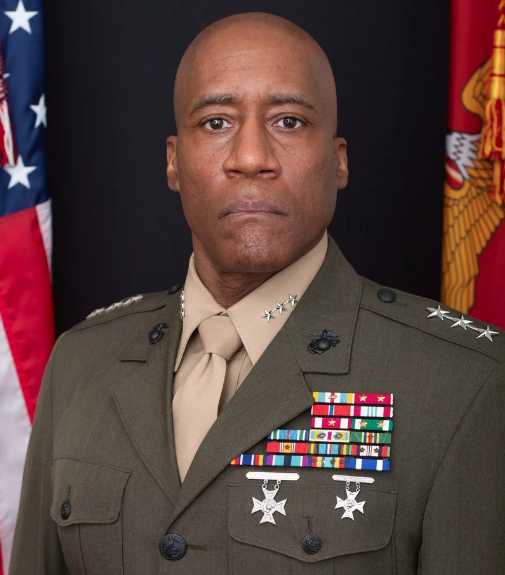The Marines are set to have the first Black 4-star general in their 246-year history
Lt. Gen. Michael E. Langley is up for a nomination that would make him the first Black four-star general in the U.S. Marine Corps' 246-year history.
U.S. Marine Corps
More than 35 years since his career in the U.S. Marine Corps began, Lt. Gen. Michael Langley could reach one of the highest ranks of the military.
Langley faces a confirmation hearing before the Senate Armed Services Committee on Thursday. If confirmed by the Senate, Langley will become the first Black four-star general in the Marines' 246-year history. He will lead all U.S. military forces in Africa as chief of U.S. Africa Command.
A native of Shreveport, La., and the son of a former, noncommissioned officer in the Air Force, Langley has commanded at every level. His posts included Afghanistan during the war and various posts in Asia and Europe.
He assumed command of U.S. Marine Corps Forces Europe and Africa last year, "after his predecessor was removed amid allegations of using a racial slur for African Americans in front of troops," according to Stars and Stripes.
He also holds multiple advanced degrees, including masters in National Security Strategic Studies from the U.S. Naval War College and Strategic Studies from the U.S. Army War College.
As of last year, Langley was one of only six Black generals in the Marines, Stars and Stripes reported.
Diversity in the military has been a long-standing issue, and one some leaders have been attempting to address in recent years.
President Harry Truman desegregated the armed forces in 1948.
As a service member reaches the higher ranks in the military like, generals in the Air Force, Army and Marine Corps, and admirals in the Coast Guard and Navy, leaders are more than 80% white, according to research by the Council on Foreign Relations.
James Stavridis, a retired Navy admiral and former NATO supreme allied commander, previously told WBUR that racism has been an issue in the military for some time.
Stavridis said the military must do better work in representing Black, Latino, and Asian members in the higher ranks.
"The way to do that is to get them into the mid-career jobs that lead to those flag ranks," Stavridis said. "That has to happen as a result of mentorship, just as it does in the civilian world, just as it does in the academic setting."
"Ninety-nine percent of my experiences coming up through the ranks have been positive ones that can be characterized as opportunities to excel, to gain success," Langley told Stars and Stripes in a profile last year. "As far as adversity, it came in moments. They were always learning experiences to me. But they were few and far between."


